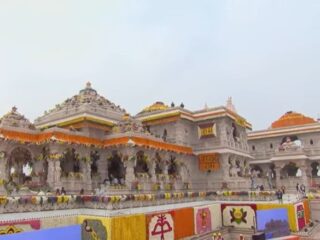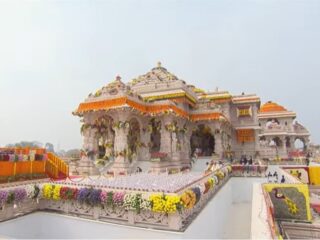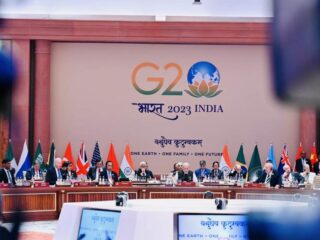Asghar Ali Engineer
(Secular Perspective March 16-31, 2012)
I was again invited to Austria invited for a conference on multi-culturalism and religious pluralism in Durnstein near Vienna. It is a beautiful medieval village with several churches and beautiful medieval buildings on the bank of river Danube in the midst of hills. Its beauty was indeed ethereal and location of the Hotel in which I was made to stay was breath takingly beautiful. I reached just a couple of hours before the inaugural session of the conference began on 23rd February.
I was requested to deliver inaugural address on diversity and pluralism with reference to Indian experience. The conference was sponsored by the provincial government and Ms. Ursula Baatz, a noted journalist from Vienna was its moving spirit. She had taken initiative to organize this important conference. She had visited our office in Mumbai a few years ago and she had appreciated our work and hence she thought of inviting me to inaugurate this conference.
The inaugural session was attended by Deputy Governor, the Abbey (i.e. the Chief Priest of the Church), Chancellor of the University and other dignitaries. I was introduced by Ursula Baatz and I delivered my inaugural address referring to positive and negative sides of Indian diversity, religious pluralism and multi-culturalism. I said that India has been bewilderingly diverse since inception of its history and this diversity spans over religions, cultures and languages besides social customs and traditions. It would be no exaggeration to say that every 10-20 kms social, cultural and religious traditions change and linguistic dialects too.
We Indians have lived with this diversity throughout history without much problems. In fact this diversity has been our strength, not weakness until recently. It is British colonial power which tried to divide us and partitioned our country when they left us in 1947. Europe, on the other hand, began to become diverse only after Second World War and they needed labour in post World War II when they needed workers for reconstruction of war ravaged economy.
It should be remembered that this conference in Austria was convened in the background of rising rightwing forces resulting in inter-religious tension. Those activists who want inter-religious peace are worried over increasing inter-religious tension and hence want to know the causes and remedy of such tension. The vote share of rightist forces has recently gone up to 30 per cent which is quite worrying percentage.
Remember the BJP’s percentage in 1999 elections when NDA came to power was 29 almost similar to this percentage. And BJP also came to power by creating religious frenzy in the name of Ramjanambhoomi controversy. The rightist forces create religious frenzy and polarize the civil society in the name of religion and culture. The media is part of this hate campaign be it in India or be it in Western countries.
I threw light in my inaugural address on the role of media both in India as well as in the West. Western media claims to be quite ‘objective and unbiased. But it is a sheer myth. Western media is heavily biased both racially and religiously. It was always anti-Islam right from colonial days when colonial masters were confronted with resistance from Muslims in general and religious leaders, in particular.
It considered colonized people in general and, Islam and Muslims, in particular, backward and even barbarians and they even claimed they have come to these countries to ‘civilize’ these subjects people. It is interesting to note that so-called ‘barbarians’ were much more civilized as in India their leader Mahatma Gandhi resisted colonial rule by non-violent way when the ‘civilized’ colonialists were using brute force against them and killing them mercilessly.
I also pointed out that the western media has become much more biased against Islam and Muslims after 9/11 and is contributing to totally biased views about Islam. The journalists who write never take trouble to study Islam and divergent views among Muslims about issues like jihad, veil and rights of women. They deliberately pick and choose examples and exaggerate minority extremist views.
These journalists, be they in Western countries or in India, are product of majoritarian views on religion and culture. Majoritarian viewpoint directly affects the minority rights and quality of democratic governance. If people are generally prejudiced it becomes difficult not only to maintain law and order in the society but also ensure proper development of religio-cultural minorities.
In India, for example, constant propaganda (by rightist forces as well as biased reporting of both print as well as electronic media) creates powerful prejudices in a large section of majority community and are easily provoked to commit violence against minorities even on petty issues. As there is lot of poverty and unemployment it becomes all the more easy to make them take part in mayhem and loot and plunder.
This may not be easy in western countries as extent of unemployment is much less compared to India and temptation to loot and plunder comparatively much less. However, quality of governance does get affected in western countries also. Like the BJP in India, it is interesting to note,, the rightist forces in Europe also insist that our culture is Christian culture (not secular one) and look down upon minority cultures.
During the discussion the famous Austrian actress Katherina Stemberger pointed out that in Austrian court there is a cross hanging on the wall behind the back of the judge. What effect will it have on the mind of a minority victim? Will he get justice? If we are secular why a cross, a symbol of Christianity, should be hanged on the wall of a secular court? The Abbey thereupon said what is wrong in it? Does cross not hang on the walls of schools and hospitals?
I, there on pointed out we face such problems in secular India too. There are pictures of Hindu gods and goddesses in police stations and majority community (except those who are ideologically secular) sees nothing wrong. It even justifies it. I told the Abbey that if there is cross on the walls of schools and hospitals, they are run by missionaries and they have right to display cross but as for court of justice it is public space and should not be occupied by any religious symbol.
The Abbey was very kind person. He appreciated my inaugural address as well as my interventions in debate. However, he did not know English and knew only German. There was simultaneous translation in both the languages i.e. from German to English and English to German. He would try to express himself but would succeed in making some gestures and I would understand his intention.
The recent downturn in economy has further accentuated the crisis (though Austria has not been very badly hit). But in most other European countries economic crisis and increasing unemployment has definitely made immigrants most unwelcome guests. In Austria there is large number of Turkish Muslims who came in early sixties when workers were greatly needed.
These Turkish Muslims are looked down upon. There is, like in India, some political problem also. The Turkish rulers in sixteenth century had reached right up to Austria though they could not succeed in establishing their rule. But they are looked upon as invaders. Also, thanks to media Islam is looked down upon as violent and intolerant religion which hates all non-believers.
Various presentations were made by many university professors, activists and journalists. There were large number of women among the participants and played very active role in discussions. Katherina, who had come on the last day i.e. on 26th February (the conference was from 23rd to 26th February 2012) was quite secular and also feminist. When discussion turned to the women’s rights, she raised a point and quoted from Christian text that when marriage took place in Church in old days the priest would advise the bride to look upon her husband as a dog looks upon the master and be loyal like doing to him.
She directed the question at the Abbey and asked what a woman would think when she is likened to a dog. It was, perhaps an embarrassing question to the Priest in presence of so many women. The Abbey smiled and said you know it is a medieval text and no more used in the Church.
All those participants in the discussion as well as presenters were quite secular in outlook and were worried that rightwing influence is increasing and their vote percentage was increasing due to economic crisis. The discussions were also quite rich and inspiring. And everybody felt such conferences are needed frequently. Ursula Baatz announced that there will be another conference next year and we bid good bye to each other and left. I also had to catch my flight to Mumbai same night.
—————————————————–
Centre for Study of Society and Secularism
Mumbai.




